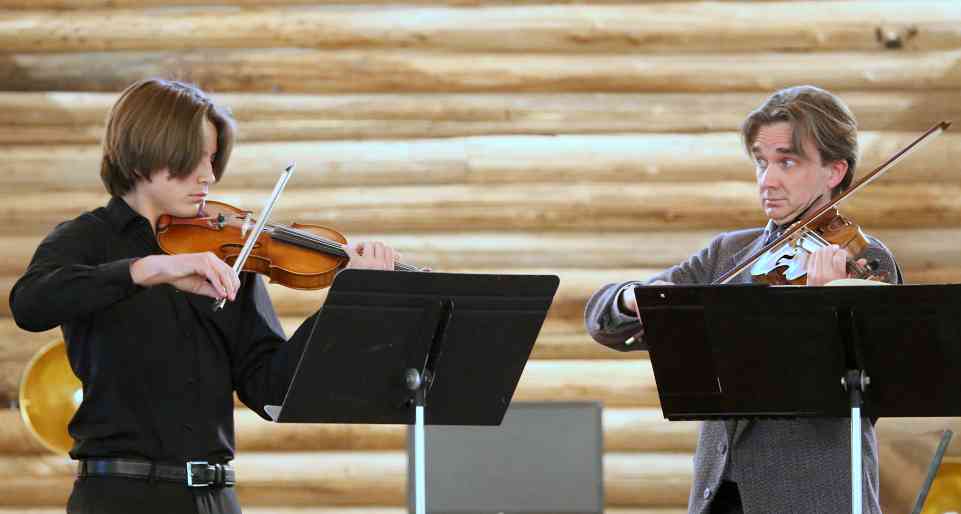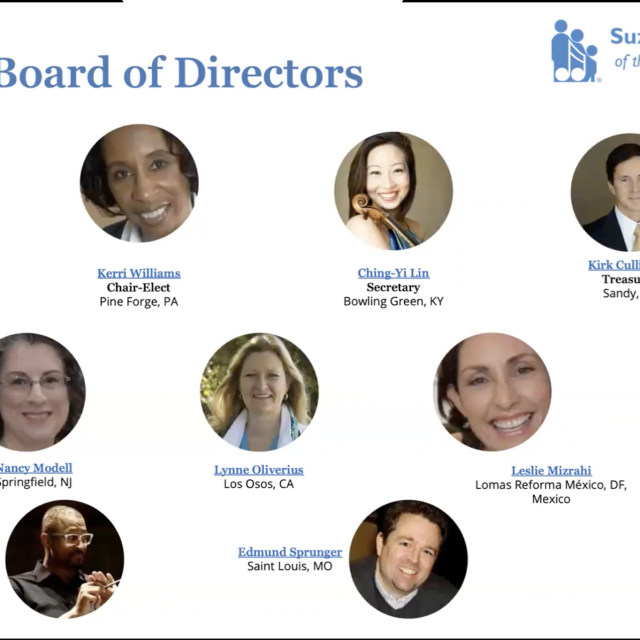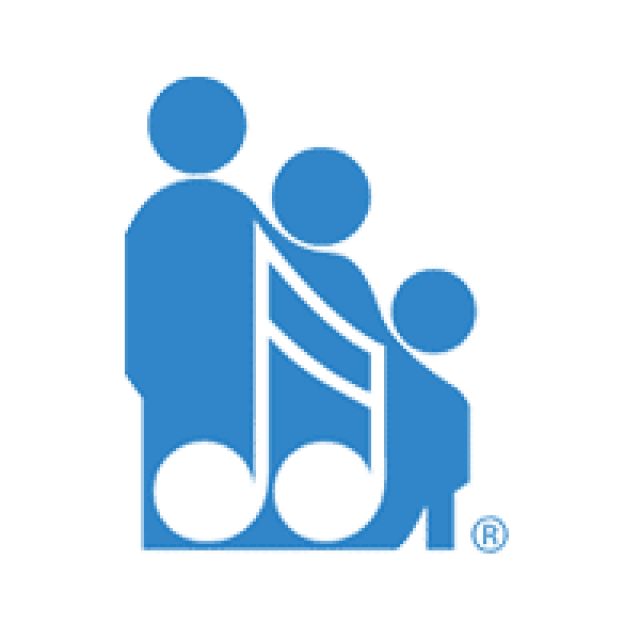Six years ago, I did something unimaginable: I quit a full-time university job. My friends were concerned, my family was considering an intervention, my colleagues were aghast. Comments were whispered in hallways and classrooms about my mental health. “He is too old for a midlife crisis but. . . .” “What is he thinking . . .?” “How could he even consider . . .?” I’ll admit, it was two parts crazy to one part blind optimism and zero parts practicality, but this is the story of how it all worked out.
I have a doctorate from Stony Brook University in violin performance, and before the ink was dry on that diploma, I was getting academic jobs. First at a pre-college program, then as a visiting artist at a small liberal arts school, and then finally at the university where I would work for fifteen years; going from instructor to tenure track, and then all the way up the ladder to tenured full professor. I was chair of the faculty senate Professional Affairs Committee. There was talk of my becoming chair of the department. I helped run a little festival in Italy, I performed regularly abroad and on a modest artist series I founded. Looking back at this in light of the current job environment in the US, everyone would say I had it made. Security, social position, a full performing calendar. I was all set.
And I was thoroughly miserable. The industry had changed profoundly in fifteen years. What was once a dream job had become a tangle of unsolvable dilemmas and conflicting pressures. Where once professors were trusted to run their own programs, they were now spending significant amounts of time and energy chasing the latest rubric fad, filling out endless benchmark and attendance reporting forms, and being increasingly forced to think of their public universities and department as for-profit businesses. Administrative positions once filled, somewhat grumpily, by senior faculty drafted by their colleagues to serve limited terms are now often being filled by careerist-administrators with little connection to, or respect for the departments they oversee. Added to all of this is the ongoing national crisis in public education. At my university, 80% of our students were education majors, and when I started there, we proudly touted a 100% job-placement rate. Seven years ago, those once secure jobs were already becoming less available, and turning into heavily loaded kitchen-sink jobs, or traveling positions with far too many schools, or being split into multiple part-time positions with no benefits. It’s now widely known that the quality of life of public school educators has been declining significantly for years. Even back then, before COVID, it was getting a lot harder for me to believe my own recruitment pitch, and I worried about the kind of future my hardworking BME students would be walking into.
So in the end, the pressures of recruitment numbers, department faculty to credit hour generation ratios, and the trickle-down effect of politically unreliable university budgets were more than enough to take the shine off what probably looked, from the outside, like an ideal life and a secure job. I was in an ever-increasing moral crisis because I no longer felt I could justify the work I was doing as being of true benefit to society, or even as being personally fulfilling. I blundered about trying to find the change that would make everything make sense. Mistakes were made. People were hurt.
Then my wife got a job offer to teach in the beautiful little resort town of Durango, Colorado. I had always planned to retire back in Colorado where I was born and raised, and I had a long-simmering fantasy of going back to my pedagogical roots as a Suzuki kid by starting my own Suzuki program. Suddenly, I had a chance to turn everything upside down, and just leave it all. To “Retire” while I still had good health, relative youth, and the energy to write a very different final chapter for my career. All I had to do was to walk away from tenure and a defined benefit retirement plan.
Throughout my entire academic career, I maintained a small but active pre-college studio, and it had always been a source of inspiration, rejuvenation, and enjoyment for me. I was also active in supporting the pre-college string academy associated with my university. As a professor, I had a whole week of lectures in my pedagogy syllabus about building a private studio. Now I would see if I could follow my own advice, and turn my side-gig into a full-time job. I met with the local college professor in Durango to see if he would be supportive of someone with similar credentials to his own setting up in his little town. (He was). I met with local teachers to see if the market was saturated or not (It wasn’t), and I even answered an ad through the SAA from some local parents looking for a Suzuki teacher, because someone had left the area after running a small studio for several years. It was really the parents’ group that made me realize that this could actually work. I went back to my university town and spent a few sleepless nights ruminating before finally deciding it was time to pull the trigger. My letter of resignation was accepted in a one-sentence email just 45 minutes after I hit send. Life was about to change.
I contacted the parents’ group and let them know I was taking students. I gave an open master class, leveraging my then still-current credentials as a university professor and passing out flyers for the new studio I was to start. By late spring, I had enough students interested to think that my wife and I would, just maybe, be able to cover our bills. A great weight began to lift from the back of my neck as I thought about working full-time with beginners and young people. It was still crazy, but it wasn’t going to end with me busking on a street corner in a badly trimmed beard. I rented out my house. Packed, sold, or gave away most of my belongings, then headed west.
I taught out of our one-bedroom apartment through the summer. As word spread, I gathered a few more students, and was able to justify renting studio space in an amazing, historic building in town. I was overwhelmed by the kindness and support of the local music community in the four corners area, and there were even some joyful and rewarding performance opportunities.
I spent a lot of time hiking in the woods going back over my life and career choices. I saw how few of them came from a genuine desire to do good in the world and how many of them were driven by fear or ego, and a need for validation. It was a lot to process, and it was neither flattering nor fun, but it provided a profound contrast between my old academic life, and what my afternoons in the studio were now like. These things are difficult to quantify. Starting out in academia, I truly believed that by teaching at a state university in a rural area, I would be able to make a significant difference in education, in the arts, and in the culture of the region, and that I’d be doing something truly transformative for my students. I think for many years that was true, and I’m sure it still is for many of my former colleagues or for others in similar positions. But for me, the negatives came to outweigh whatever good I felt I was doing. As a studio teacher, I once again have the full control over my program that I had lost in academia. I am able to measure my students’ progress in my own way. I can continually take stock of what I’m doing, and I can make the changes I feel are needed rather than chasing after whatever benchmark is being imposed in accordance with the latest jargon currently in fashion, and without it having to go through three different committees. My teaching load, while significant, is entirely of my own making, and I wouldn’t trade a single hour of it.
I really can’t fully express how joyful it is to go from being on my knees one moment with a five-year-old pre-twinkler who just figured out her 3-finger plops on the A-string, to, in the next moment, teaching Flesch scales and Saint Saens’s Third Concerto to a high school kid THAT CAN REALLY PLAY. Every hour is different, with each kid blowing me away with their resilience, dedication, and the pure joy they find in their own small victories. Many of the kids that first started with me as transfer students six years ago are now graduating from high school. I can see the length and breadth of their personal and musical journeys over that span of time, see the part I played in them, and feel tremendous pride.

The author (right) performing with his student Rei Rasmussen.
I know, without any hint of self-doubt or cynical whisper of imposter syndrome, that I am doing right by these young people. Technically, musically, pedagogically. The perspective I have from fifteen years of teaching primarily BME students is profoundly beneficial and relevant in every minute of every lesson. After so many years of trying desperately to make up for too much bad teaching and too much lost time in order to get somebody more-or-less graduated in four years, I am now able to help young players at the time when this help does them the most good. And I love every minute of it.
My goal will never be to have prodigy students, though it turns out that my advanced students now are generally playing at a much higher level than most of my college students ever did. My goal is to nurture kind young people who love the violin, love music, and bring the lessons they have learned from their violin study into every aspect of their lives. My life doesn’t look much like it did seven years ago. I don’t have concerts in Italy, I can’t offer prestigious performances or projects to friends and colleagues, I’m not on big stages with big audiences basking in the adrenaline rush of performing major repertoire. But I go to bed each night knowing that I did a little bit of good for a bunch of little people who think the world of me. That I taught the violin the way it should be taught. That I put a tiny bit of Vivaldi, or Mozart, or Brahms, into those young veins, and that my passion for these things will continue, through them, long after the lessons end.
I have learned a lot in this new role over the past six years and my teaching has been transformed in many significant ways. The major lessons I have learned are these.
Be excited. I am not adept at using games and gimmicks in lessons, which I know can be helpful in keeping younger students excited and tricking them into practicing, but what I am great at is being energetic, enthusiastic, and excited about each thing we learn. A corollary of this is that it takes however long it takes. My standards don’t change from student to student, but now each kid can take the time they need to grow into each skill set naturally. What takes one student a month might take another a year. And that is just fine.
Be kind. Studio teaching requires a lot more patience and compassion than I ever applied in the college job. I had the assumption that by choosing a music major, your dedication to and love for music was a given. Now I get to see young people grow into that love and dedication, and that doesn’t happen if their teacher gets cranky with them every other lesson. Being kind in the studio also means being kind to myself. I make mistakes, but I don’t flay myself alive over them anymore. Studio teaching is a process of joyful experimentation, but not every experiment is a success.
Be resolute. I have very strong convictions about the violin. About technique, intonation, and tone production. About style, nuance, and musicality. I lean into those convictions every day in every lesson. I don’t give up, I keep persistently nudging each little setup in the right direction, even if it takes years. Not every student is musically gifted, or has an innate sense of pitch, but every student in my studio works on improving these things in every lesson. Nobody gets a pass. This means that book graduations might take student A six months, and might take student B two years. And that is Just. Fine.
Communicate. I still have to be careful that I’m not speaking to a six-year-old like they are a freshman year music major. I often have to cut myself off when I start giving a music history lecture to a ten-year-old. My studio parents are very good-natured about this, for which I’m eternally grateful. I smile a lot more, I talk about hard things in a joyful and encouraging voice, every kid is “sweetheart” or “my dear one” or “kiddo” (for which I could have been fired in academia). I give hugs, and pats on the back, and fist bumps. I send out mid-semester progress reports, and I work to strike a well-informed-but-not-spammed balance in the regular studio information emails.
There is no doubt that I am a happier person than I was as an academic, and I hope (and would like to believe) that I am a better, kinder, and more patient one. These are the precious gifts given to me by the amazing families in my program, and by the guiding principles of the Suzuki philosophy. I continue to learn from the wonderful studio teachers in my area, and most of all from my students. This freedom to constantly grow and adapt is one of the best things about studio teaching, and in the end, is the reason why I made the leap. My hope is that those reading this, some of whom might have looked at academic life a bit wistfully, can see that the reality is perhaps not as ideal as is often assumed. I’m also not suggesting it’s something everyone with academic positions should consider. My decision to leave my old job was terrifying, but for me, it was time to take a deep breath, close my eyes, and jump.

Brandon Christensen
Brandon Christensen, D.M.A., is the founder and director of the Christensen String Studio in Durango, Colorado: www.christensenviolin.com. He returned to his home state of Colorado after a 17-year career as a college violin professor that included performances throughout the United States, Europe, and Asia, and serving as the director of pre-college programs in the United States and China.








